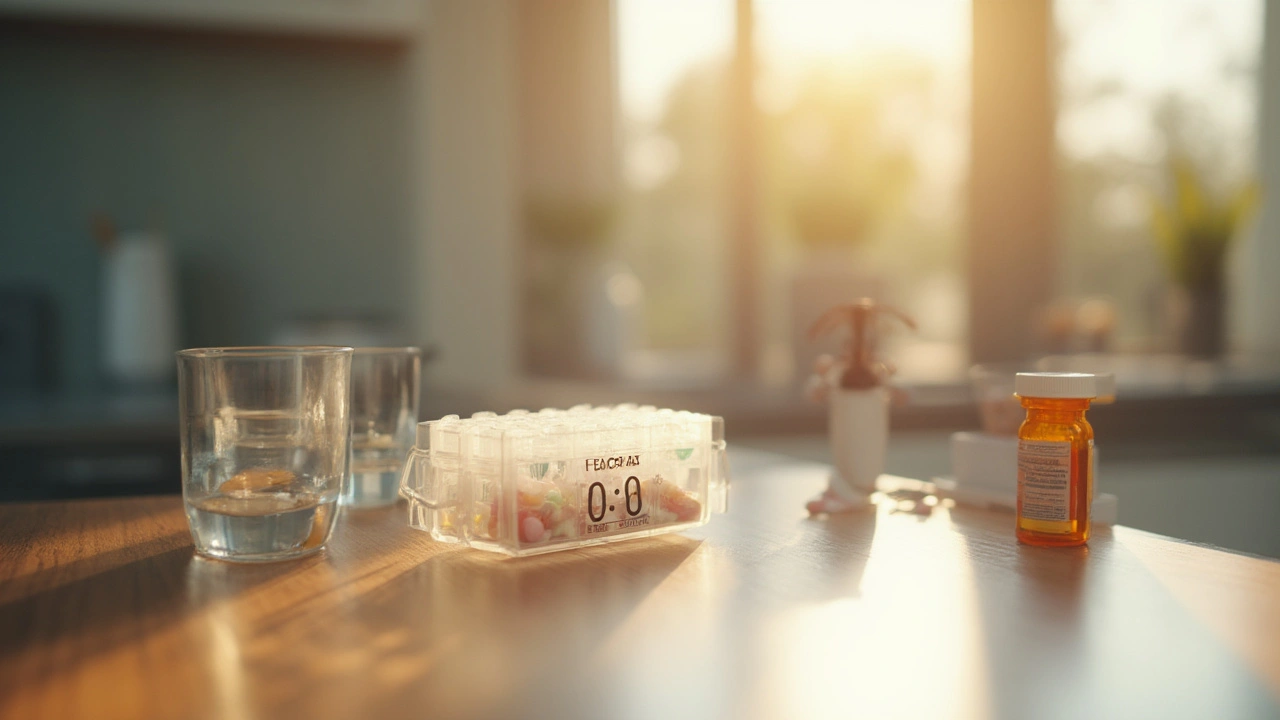Imagine popping your morning pill and thinking: does it really matter if I take this now or after lunch? For doctors and pharmacists, this question isn’t just filler—timing literally shapes how well your medicine works and how your body handles side effects. A dose too early, too late, or at the wrong time of day can turn an effective drug into a dud, or even cause harm. A 2023 research review in The Lancet found up to 70% of blood pressure patients saw dramatically different results depending on when they took their meds. That’s a massive impact, and it’s not just about heart pills. Statins, diabetes meds, allergy tablets—even painkillers—all can work better or worse depending on the clock.
The Science Behind Medication Timing
Our bodies run on an internal clock. This isn’t a metaphor—your "circadian rhythm," ruled by the brain’s hypothalamus and tweaked by light, stress, and mealtimes, tells your organs when it’s time to wake up, eat, repair, or rest. So, when you swallow a pill, it’s not entering a static system. Your stomach, liver, kidneys—they all change their activity levels through the day and night. The liver, for example, can break down drugs twice as fast at 2 p.m. as at midnight. This is why, for some meds, taking them at night means you get more drug in your bloodstream and less wasted in the toilet.
Here’s something most people don’t realise. Medicines don’t just depend on your routine—they depend on the body’s. Melatonin supplements (for sleep) work best if taken two hours before lights-out. Statins, especially simvastatin, struggle to lower cholesterol if taken in the morning, because the body creates most of its cholesterol at night. Anti-hypertensives (blood pressure pills) like perindopril often work best before bed, not breakfast, as this prevents early morning blood pressure surges and halves the risk of peaks before you punch in at work.
But get this—some drugs flip the rule. Thyroid medication, like levothyroxine? It’s all about empty-stomach absorption—so you want it thirty minutes before breakfast, or at least three hours after dinner. Metformin for diabetes doesn’t really care about time of day but does demand you eat with it, to sidestep nasty stomach upset.
This isn’t just textbook trivia. In 2024, the Royal Melbourne Hospital tracked nearly 6,000 patients and found that 80% were routinely taking their morning doses at wildly different times, even though instructions were often clear. That chaos meant less predictable effects, and more side problems. Especially in older adults or those juggling multiple meds, mistimed pills are now Australia’s leading cause of preventable drug-related hospital admissions. Here’s how those numbers stack up around common conditions:
| Condition | Medication | Best Time | Reason |
|---|---|---|---|
| High Blood Pressure | Perindopril, Amlodipine | Evening/Bedtime | Reduces AM blood pressure surge |
| Cholesterol | Simvastatin | Night | Liver makes most cholesterol at night |
| Type 2 Diabetes | Metformin | With food | Limits stomach side effects |
| Thyroid | Levothyroxine | Morning, empty stomach | Best absorption |
| Pain (NSAIDs) | Ibuprofen | With meals | Prevents stomach irritation |
Also, some allergy tablets (antihistamines) cause less drowsiness if taken before bed. Even antibiotics can have unique timing—some need strict dosing intervals around the clock to keep blood levels steady. So, yes—time matters, and reading the label is never a waste of two seconds.

Tips for Remembering and Managing Your Medication Timing
Even those who are great at following orders sometimes forget, especially with busy lives and complicated regimens. If you’ve skipped a dose or accidentally doubled up, you’re far from alone—in 2025, nearly 50% of Australians over age 40 reported at least one medication mishap in the past year. But there’s plenty you can do to stay on track and stay healthy:
- Set alarms or smartphone reminders. This sounds simple, but it’s the gold standard in making sure you never miss or mistime a pill.
- Use a pillbox that’s labeled by day and time. This cuts confusion, especially if you’re juggling a morning, afternoon, and night routine.
- Link medication to a daily habit. Take meds before brushing teeth, after you put the kettle on, or right before you feed the dog.
- Get to know your labels. “Take with food” means swallow the pill as you eat or just after. “Empty stomach” generally means at least an hour before or two hours after a meal.
- Don’t assume all medicines want food. Some pills need food to avoid stomach irritation, others need space from your meals for best uptake. Ask your pharmacist if you’re not sure.
- Traveling or changing your schedule? Double-check with your doctor or pharmacist, especially for drugs tied tightly to the body’s clock—jetlag can mess things up.
- If you miss a dose, don’t double up unless told. For most medications, if you realise within a few hours, you can catch up. If it’s nearly time for the next dose, skip and stick to your usual timing.
- Keep a simple medication diary. Record each dose with the date and time. This is handy for you and your healthcare team.
If you live with someone—family or roommate—loop them in, especially if you ever get muddled about timing. Support never hurts. And if some days you genuinely can’t remember if you took your medicine, keep a little notebook or use a medication app, many of which now notify and let you tick off each dose. These might seem like tiny hacks, but they massively lower your chances of error.
Let’s talk practical tips from real life. A friend of mine is on statins and used to take his pills whenever he remembered, sometimes at breakfast, sometimes after footy practice. Once he switched to taking them every night when brushing his teeth, not only did he never miss a dose, but his cholesterol levels improved by his next check-up. It’s not about extraordinary discipline, it’s about weaving meds into a pattern that’s easy to remember.
Pharmacists see the chaos that follows ‘occasional’ timing. One local case saw a man on blood thinners who’d take them ‘with whatever meal he remembered,’ leading to four hospital visits for minor bleeds over one year. Once his GP and pharmacist got together, drew up a strict pill and meal schedule, and stuck it on his fridge, he had zero hospital visits in twelve months. That’s the power of timing.
Even tech can join the cause. Australia’s government funds the My Health Record system, which lets you and your doctors see all your prescriptions in one spot and set up digital reminders. A 2024 app update even links with Google and Apple calendars—so your meds show up right next to your work meetings. No more excuses about being ‘too busy.’

Common Myths and What Happens If You Get the Timing Wrong
Let’s bust a few stubborn myths. It’s not true that “it doesn't matter when I take my medicine as long as I don’t miss doses.” The risks can be serious. Take warfarin, a common blood thinner: mistimed doses mean unreliable blood levels, which messes with its power to prevent clots—resulting in more strokes or dangerous bleeding (in 2023, delayed doses caused 13% more complications in older patients nationally). Another myth? “Bedtime always works best.” As tempting as that routine is, bedtime is not magic—some medicines need the presence or absence of food, light, or activity to perform at their peak.
Staggering medications willy-nilly isn’t clever if you’re on more than one, either. Taking iron tablets with calcium or dairy products within two hours will block iron’s absorption, so spacing out is critical. The same goes for certain antibiotics and antacids: taken together, one hijacks the other, and the infection hangs on.
The “I can skip today and double up tomorrow” shortcut is just as risky. Particularly with blood pressure pills, antidepressants, or epilepsy drugs, this trick can trigger severe side effects—think dizziness, headaches, even withdrawal or fits. Also, antibiotics run a unique race: missing doses or ending too early lets bacteria survive and adapt, fueling those drug-resistant superbugs that keep popping up in hospital news stories.
Young or old, timing mistakes don’t play favorites. At Melbourne’s Alfred Hospital last year, more than 500 people were treated due to medication errors—most from mix-ups and missed timing, not overdose. That’s a real human cost, often preventable with better information and simple reminders.
So, what’s the take-home? The right timing can transform side-effect-prone or barely-working drugs into safe, efficient helpers for everything from cholesterol to mood. Want to avoid expensive hospital bills and nasty symptoms? Talk to a healthcare pro about your medicines, use modern tools to keep order, and treat dosing times like the important health decision they are. Your body—and your peace of mind—will thank you.







Rajat Patil
July 17, 2025 AT 22:49